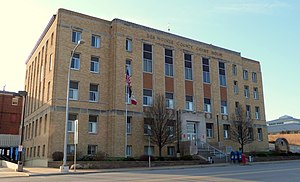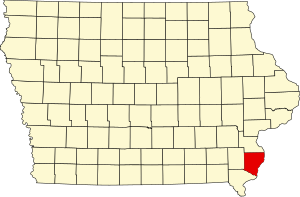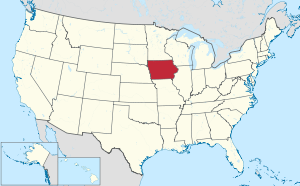Des Moines County is located in the U.S. state of Iowa. As of the 2020 census, the population was 38,910.[1] The county seat and largest city is Burlington.[2] It is one of Iowa's two original counties along with Dubuque County; both were organized by the Michigan Territorial legislature in 1834. Des Moines County is part of the Burlington, IA–IL Micropolitan Statistical Area.
Des Moines County | |
|---|---|
 Des Moines County Courthouse | |
 Location within the U.S. state of Iowa | |
 Iowa's location within the U.S. | |
| Coordinates: 40°55′40″N 91°11′02″W / 40.9278°N 91.1839°W | |
| Country | |
| State | |
| Founded | 1834 |
| Named for | Des Moines River |
| Seat | Burlington |
| Largest city | Burlington |
| Area | |
• Total | 430 sq mi (1,100 km2) |
| • Land | 416 sq mi (1,080 km2) |
| • Water | 14 sq mi (40 km2) 3.2% |
| Population (2020) | |
• Total | 38,910 |
• Estimate (2023) | 38,253 |
| • Density | 90/sq mi (35/km2) |
| Time zone | UTC−6 (Central) |
| • Summer (DST) | UTC−5 (CDT) |
| Area code | 319 |
| Congressional district | 1st |
| Website | www |
Des Moines County should not be confused with the city of Des Moines, which is the capital of Iowa. Des Moines County sits on Iowa's eastern border alongside the Mississippi River. The city of Des Moines is in Polk County in central Iowa. Both places derive their name from the Des Moines River, which flows through the city of Des Moines and originally flowed through the county. When the county was divided early in Iowa's history, the river ended up further west, forming the border between Lee County, Iowa and the state of Missouri.
History
editAt an extra session of the Sixth Legislative Assembly of Michigan Territory held in September 1834, the Iowa District was divided into two counties by running a line due west from the lower end of Rock Island in the Mississippi River. The territory north of this line (which started just south of the present-day Davenport) was named Dubuque County, and all south of it was Demoine County. It was named after the Des Moines River.[3] From July 3, 1836, until July 3, 1838, Des Moines County was part of Wisconsin Territory. The county underwent various border changes during this time. July 4, 1838, the named county became part of Iowa Territory (later the state of Iowa).[4]
The current Des Moines County Court House was completed in 1940.[5] The Iowa Army Ammunition Plant was also established in 1940.
Geography
editAccording to the U.S. Census Bureau, the county has a total area of 430 square miles (1,100 km2), of which 416 square miles (1,080 km2) is land and 14 square miles (36 km2) (3.2%) is water.[6] The Mississippi River forms the east border; Skunk River, the south border; and the county is drained by Flint Creek.[7]
Major highways
editTransit
editAirport
editThe Southeast Iowa Regional Airport (IATA code BRL), is located on the southern side of Burlington.
Adjacent counties
edit- Louisa County (north)
- Hancock County, Illinois (southeast)
- Henderson County, Illinois (east)
- Lee County (south)
- Henry County (west)
Demographics
edit| Census | Pop. | Note | %± |
|---|---|---|---|
| 1850 | 12,988 | — | |
| 1860 | 19,611 | 51.0% | |
| 1870 | 27,256 | 39.0% | |
| 1880 | 33,099 | 21.4% | |
| 1890 | 35,324 | 6.7% | |
| 1900 | 35,989 | 1.9% | |
| 1910 | 36,145 | 0.4% | |
| 1920 | 35,520 | −1.7% | |
| 1930 | 38,162 | 7.4% | |
| 1940 | 36,804 | −3.6% | |
| 1950 | 42,056 | 14.3% | |
| 1960 | 44,605 | 6.1% | |
| 1970 | 46,982 | 5.3% | |
| 1980 | 46,203 | −1.7% | |
| 1990 | 42,614 | −7.8% | |
| 2000 | 42,351 | −0.6% | |
| 2010 | 40,325 | −4.8% | |
| 2020 | 38,910 | −3.5% | |
| 2023 (est.) | 38,253 | [8] | −1.7% |
| U.S. Decennial Census[9] 1790-1960[10] 1900-1990[11] 1990-2000[12] 2010-2018[13] | |||
2020 census
editThe 2020 census recorded a population of 38,910 in the county, with a population density of 91.615/sq mi (35.373/km2). 94.26% of the population reported being of one race. 82.03% were non-Hispanic White, 6.51% were Black, 3.20% were Hispanic, 0.20% were Native American, 1.04% were Asian, 0.06% were Native Hawaiian or Pacific Islander and 6.97% were some other race or more than one race. There were 18,782 housing units of which 16,751 were occupied.[1]
| Race | Num. | Perc. |
|---|---|---|
| White (NH) | 32,753 | 84.2% |
| Black or African American (NH) | 2,501 | 6.43% |
| Native American (NH) | 67 | 0.2% |
| Asian (NH) | 398 | 1.02% |
| Pacific Islander (NH) | 21 | 0.05% |
| Other/Mixed (NH) | 1,925 | 5% |
| Hispanic or Latino | 1,245 | 3.2% |
2010 census
editThe 2010 census recorded a population of 40,325 in the county, with a population density of 96.9002/sq mi (37.4134/km2). There were 18,535 housing units, of which 17,003 were occupied.[15]
2000 census
editAs of the 2000 census,[16] there were 42,351 people, 17,270 households, and 11,536 families residing in the county. The population density was 102 inhabitants per square mile (39/km2). There were 18,643 housing units at an average density of 45 per square mile (17/km2). The racial makeup of the county was 93.69% White, 3.57% Black or African American, 0.25% Native American, 0.59% Asian, 0.04% Pacific Islander, 0.68% from other races, and 1.18% from two or more races. 1.75% of the population were Hispanic or Latino of any race.
There were 17,270 households, out of which 29.60% had children under the age of 18 living with them, 52.70% were married couples living together, 10.50% had a female householder with no husband present, and 33.20% were non-families. 28.60% of all households were made up of individuals, and 12.60% had someone living alone who was 65 years of age or older. The average household size was 2.40 and the average family size was 2.94.
In the county, the population was spread out, with 24.40% under the age of 18, 8.50% from 18 to 24, 26.10% from 25 to 44, 24.30% from 45 to 64, and 16.70% who were 65 years of age or older. The median age was 39 years. For every 100 females, there were 93.50 males. For every 100 females age 18 and over, there were 90.30 males.
The median income for a household in the county was $36,790, and the median income for a family was $45,089. Males had a median income of $34,880 versus $22,530 for females. The per capita income for the county was $19,701. About 8.20% of families and 10.70% of the population were below the poverty line, including 17.30% of those under age 18 and 7.40% of those age 65 or over.
Communities
editCities
editCensus-designated places
editOther unincorporated communities
editTownships
editPopulation ranking
editThe population ranking of the following table is based on the 2020 census of Des Moines County.[1]
† county seat
| Rank | City/Town/etc. | Municipal type | Population (2020 Census) |
|---|---|---|---|
| 1 | † Burlington | City | 23,982 |
| 2 | West Burlington | City | 3,197 |
| 3 | Mediapolis | City | 1,688 |
| 4 | Beaverdale | CDP | 880 |
| 5 | Danville | City | 927 |
| 6 | Middletown | City | 363 |
Politics
editFrom 1896 through 1960, Des Moines County was a primarily Republican county, backing Democratic nominees only four times in the period (Woodrow Wilson in 1912, with a low plurality; Franklin Roosevelt in his two landslides in 1932 and 1936; and Harry Truman in 1948). From 1964 through 2012, it became a Democratic stronghold, backing the Democratic nominee in every election in this period save in Nixon's 1972 landslide. In 2016, Donald Trump became the first Republican since 1972 to carry the county, despite narrowly losing the overall national popular vote; the county swung over 25% in his favor relative to its 2012 vote.[17] The change to the GOP happened while the county experienced an economic decline.[18] In 2020 and 2024, Trump again carried the county, with an increased vote share each time, the first time the county has voted Republican three times in a row since between 1952 and 1960.
| Year | Republican | Democratic | Third party(ies) | |||
|---|---|---|---|---|---|---|
| No. | % | No. | % | No. | % | |
| 2024 | 10,794 | 56.65% | 7,935 | 41.64% | 325 | 1.71% |
| 2020 | 10,592 | 53.08% | 8,893 | 44.56% | 471 | 2.36% |
| 2016 | 9,529 | 49.88% | 8,212 | 42.99% | 1,362 | 7.13% |
| 2012 | 8,136 | 39.91% | 11,888 | 58.32% | 361 | 1.77% |
| 2008 | 7,721 | 37.53% | 12,462 | 60.57% | 391 | 1.90% |
| 2004 | 8,221 | 39.38% | 12,456 | 59.67% | 197 | 0.94% |
| 2000 | 7,385 | 38.14% | 11,351 | 58.62% | 629 | 3.25% |
| 1996 | 5,778 | 31.11% | 10,761 | 57.94% | 2,035 | 10.96% |
| 1992 | 6,378 | 30.10% | 11,309 | 53.37% | 3,503 | 16.53% |
| 1988 | 7,652 | 39.50% | 11,593 | 59.84% | 129 | 0.67% |
| 1984 | 9,559 | 45.85% | 11,173 | 53.59% | 118 | 0.57% |
| 1980 | 9,158 | 44.85% | 9,977 | 48.87% | 1,282 | 6.28% |
| 1976 | 9,023 | 43.94% | 11,268 | 54.87% | 245 | 1.19% |
| 1972 | 10,216 | 52.77% | 8,869 | 45.82% | 273 | 1.41% |
| 1968 | 8,452 | 42.30% | 10,164 | 50.87% | 1,363 | 6.82% |
| 1964 | 5,830 | 29.50% | 13,894 | 70.31% | 38 | 0.19% |
| 1960 | 10,678 | 51.86% | 9,872 | 47.94% | 41 | 0.20% |
| 1956 | 11,152 | 55.88% | 8,781 | 44.00% | 25 | 0.13% |
| 1952 | 12,182 | 58.13% | 8,686 | 41.45% | 89 | 0.42% |
| 1948 | 7,621 | 45.56% | 8,792 | 52.56% | 316 | 1.89% |
| 1944 | 9,488 | 55.24% | 7,543 | 43.91% | 146 | 0.85% |
| 1940 | 10,988 | 62.34% | 6,578 | 37.32% | 59 | 0.33% |
| 1936 | 6,763 | 43.06% | 7,011 | 44.64% | 1,931 | 12.30% |
| 1932 | 5,590 | 35.66% | 9,395 | 59.94% | 690 | 4.40% |
| 1928 | 10,547 | 64.70% | 5,578 | 34.22% | 177 | 1.09% |
| 1924 | 7,995 | 53.98% | 2,616 | 17.66% | 4,199 | 28.35% |
| 1920 | 8,287 | 63.76% | 3,449 | 26.54% | 1,261 | 9.70% |
| 1916 | 4,132 | 49.51% | 3,827 | 45.86% | 386 | 4.63% |
| 1912 | 2,136 | 26.49% | 3,169 | 39.30% | 2,759 | 34.21% |
| 1908 | 4,153 | 48.92% | 3,975 | 46.83% | 361 | 4.25% |
| 1904 | 4,496 | 54.18% | 3,043 | 36.67% | 760 | 9.16% |
| 1900 | 4,315 | 50.72% | 3,909 | 45.94% | 284 | 3.34% |
| 1896 | 4,549 | 53.06% | 3,741 | 43.63% | 284 | 3.31% |
See also
editReferences
edit- ^ a b c "2020 Census State Redistricting Data". census.gov. United states Census Bureau. Retrieved August 12, 2021.
- ^ "Find a County". National Association of Counties. Archived from the original on May 31, 2011. Retrieved June 7, 2011.
- ^ Des Moines County Archived July 3, 2007, at archive.today
- ^ "WI: Individual County Chronologies". publications.newberry.org. Archived from the original on April 14, 2017. Retrieved September 28, 2016.
- ^ Svendsen, Marlvs A. "PWA-Era County Courthouses of IA MPS". National Park Service. Retrieved February 9, 2011.
- ^ "US Gazetteer files: 2010, 2000, and 1990". United States Census Bureau. February 12, 2011. Retrieved April 23, 2011.
- ^ Ripley, George; Dana, Charles A., eds. (1879). . The American Cyclopædia.
- ^ "Annual Estimates of the Resident Population for Counties: April 1, 2020 to July 1, 2023". United States Census Bureau. Retrieved April 2, 2024.
- ^ "U.S. Decennial Census". United States Census Bureau. Retrieved July 16, 2014.
- ^ "Historical Census Browser". University of Virginia Library. Retrieved July 16, 2014.
- ^ "Population of Counties by Decennial Census: 1900 to 1990". United States Census Bureau. Retrieved July 16, 2014.
- ^ "Census 2000 PHC-T-4. Ranking Tables for Counties: 1990 and 2000" (PDF). United States Census Bureau. Archived (PDF) from the original on March 27, 2010. Retrieved July 16, 2014.
- ^ "State & County QuickFacts". United States Census Bureau. Archived from the original on June 7, 2011. Retrieved July 16, 2014.
- ^ "P2 HISPANIC OR LATINO, AND NOT HISPANIC OR LATINO BY RACE – 2020: DEC Redistricting Data (PL 94-171) – Des Moines County, Iowa".
- ^ "Population & Housing Occupancy Status 2010" (PDF). United States Census Bureau American FactFinder. Archived (PDF) from the original on October 16, 2020. Retrieved August 15, 2022.
- ^ "U.S. Census website". United States Census Bureau. Retrieved January 31, 2008.
- ^ "Here's a map of the US counties that flipped to Trump from Democrats". www.cnbc.com. Retrieved January 11, 2021.
- ^ Gabriel, Trip (April 27, 2021). "Why Iowa Has Become Such a Heartbreaker for Democrats". The New York Times. Retrieved May 28, 2023.
- ^ Leip, David. "Dave Leip's Atlas of U.S. Presidential Elections". uselectionatlas.org. Retrieved April 25, 2018.
Further reading
edit- Antrobus, Augustine M (1915). History of Des Moines County, Iowa and its People : Illustrated : Volume 1. Chicago: S.J. Clarke Publishing Company. Retrieved April 20, 2014.
- Antrobus, Augustine M (1915). History of Des Moines County, Iowa and its People : Illustrated : Volume 2. Chicago: S.J. Clarke Publishing Company. Retrieved April 20, 2014.